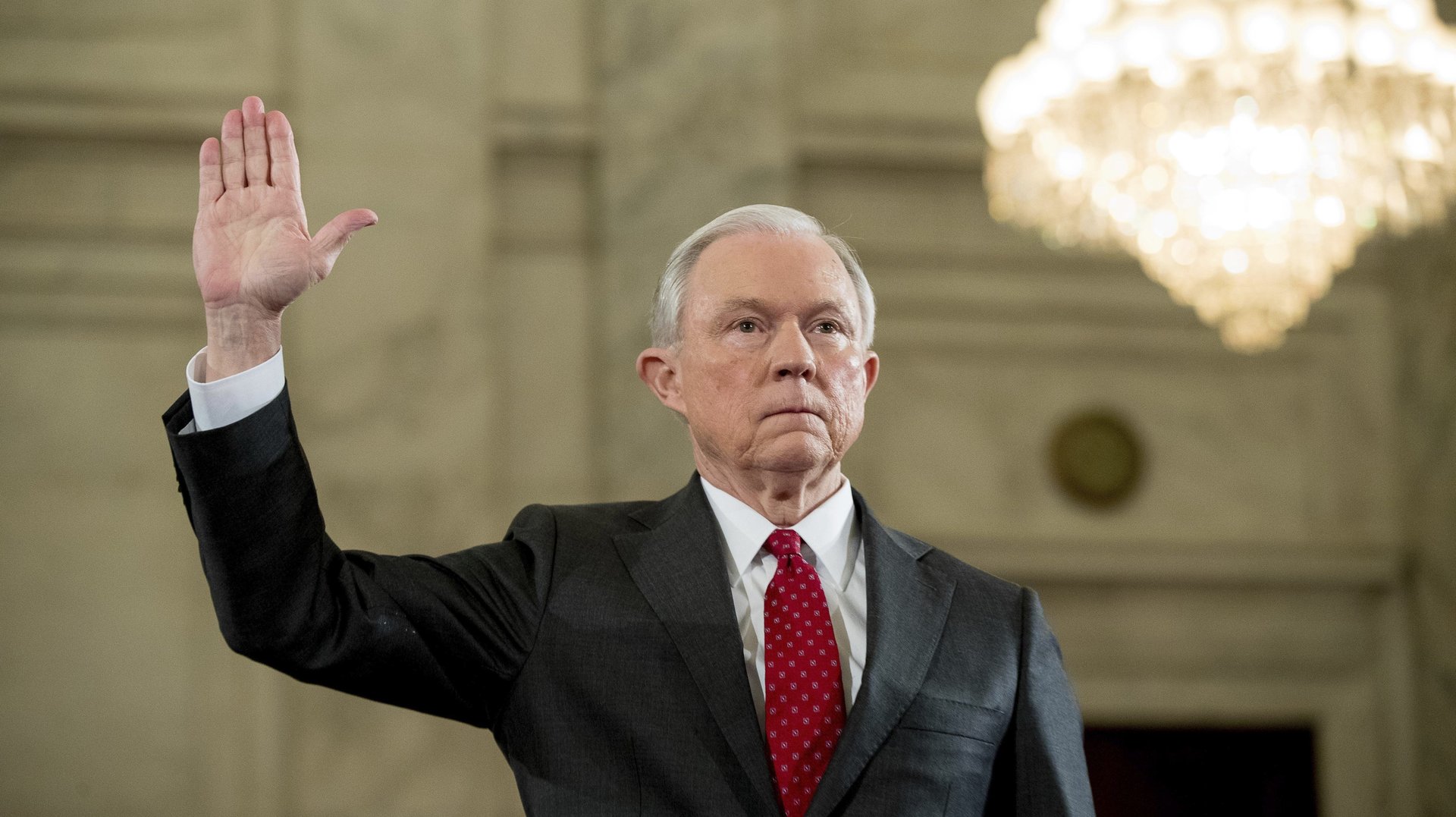What you need to know about Jeff Sessions’ Russia talks and US perjury law
Democrats and an ethics expert are calling for US attorney general Jeff Sessions to resign after his office confirmed that he spoke to the Russian ambassador last year—despite telling senators during his January confirmation hearing that he did not communicate with Russia during the presidential campaign.


Democrats and an ethics expert are calling for US attorney general Jeff Sessions to resign after his office confirmed that he spoke to the Russian ambassador last year—despite telling senators during his January confirmation hearing that he did not communicate with Russia during the presidential campaign.
Sessions spoke to the Russian ambassador to the US, Sergei Kislyak, twice last year before the US election, his spokeswoman told The Wall Street Journal and the Washington Post—once while the Republican National Convention was underway and later from his senate office.
Democratic members of Congress, including House minority leader Nancy Pelosi, Ohio Rep. Tim Ryan and Senator Elizabeth Warren from Massachusetts, demanded Sessions resign immediately.
George W. Bush’s former ethics lawyer Richard Painter is also calling for Sessions to step down. Painter told CNN that “based on what I’ve heard thus far, I don’t think he can continue as attorney general. I don’t think he was truthful with the Senate.”
Painter added “I don’t understand why he didn’t disclose to that committee the conversations he had with the Russians. This is not just any old question.”
The US laws that are relevant here apply to both “perjury” and “false statements.”
The definition of perjury has “not changed a great deal since the framing of the Constitution,” a 2014 Congressional Research report explains. US federal law defines perjury as any occasion when a person takes an oath to:
“testify, declare, depose, or certify truly, or that any written testimony, declaration, deposition, or certificate by him subscribed, is true,” then “willfully and contrary to such oath states or subscribes any material matter which he does not believe to be true.”
Anyone guilty of perjury should “be fined under this title or imprisoned not more than five years, or both.”
US federal law also prohibits false statements from anyone “within the jurisdiction of the executive, legislative, or judicial branch of the Government of the United States.” A false statement is defined as one who “knowingly and willfully”
1)falsifies, conceals, or covers up by any trick, scheme, or device a material fact;
2)makes any materially false, fictitious, or fraudulent statement or representation;
3)makes or uses any false writing or document knowing the same to contain any materially false, fictitious, or fraudulent statement or entry
During his confirmation hearing, Sessions was asked two questions about Russia, one verbally by Sen. Al Franken, the Minnesota Democrat on Jan. 10, who asked “If there was any evidence that anyone affiliated with the Trump campaign communicated with the Russian government in the course of this (2016) campaign, what would you do?”
Sessions replied, “I’m not aware of any of those activities. I have been called a surrogate at a time or two in that campaign and I did not have communications with the Russians.”
Senator Patrick Leahy, a Democrat from Vermont, asked in writing on Jan. 17 about any “legal issues” that might be raised by the relationship between Michael Flynn, the National Security Advisor who stepped down, and the Russian government. Sessions answered that they would “depend on the actual facts of any such relationship.” Leahy also asked whether Sessions accepted the conclusion of the US intelligence community that Russia hacked the Democratic National Committee, to which Sessions replied he had “no reason not to accept the intelligence community’s conclusion(s) as contained in the report.”
Finally, Leahy asked whether Sessions had “been in contact with anyone connected to any part of the Russian government about the 2016 election, either before or after election day,” to which Sessions responded simply “No.”
Sessions’ spokeswoman said he met with Kislyak in his role as a member of the Senate Armed Services Committee. Justice Department spokeswoman Sarah Isgur Flores said Wednesday night that “there was absolutely nothing misleading about his answer,” during his confirmation hearings, according to the New York Times.
In a statement on Twitter late Wednesday, Sessions said “I never met with any Russian officials to discuss issues of the campaign. I have no idea what this allegation is about. It is false.”